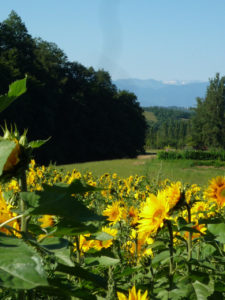Since the start of the year, local authorities in France have been banned from using chemicals to clear weeds in public spaces, on roads and on paths. From 2019 this law will also apply to private householders. This pesticide ban is part of wider legal change in environmental law which will includes a ban on throwaway plastic bags for fresh produce (including at markets) and, from 2020, a ban on plastic cups, plates and utensils.
Pesticides are now proven to be dangerous to health (as well as destroying fragile ecosystems and destroying natural balance) and, in the last few years many French communes have already begun to rethink how they can maintain public spaces without using chemicals. Many have already turned to gas burners to get rid of weeds and traditional methods such as salt and vinegar on paths.
The city of Lyon has been pesticide free since 2008 in all its 300 parks and gardens, turning instead to the help of thousands of ladybirds brought in to eat aphids and other bugs and by using mulch to stop weeds on the soil, beer traps to cut down on slugs and natural compost from its garden waste. Before 2004 it spent €30,000 a year on chemicals and pesticides on transporting 3,500 tonnes of leaves and grass clippings by lorry to a company that turned it into compost. Now the city has bought its own garden shredders and created its own composting area, increased its green spaces by 10% and the whole system pays for itself.
France does not shout about its green credentials but it is way ahead of many countries in this area and it is these continual little improvements (which often go unnoticed) that gradually but substantially improve the much talked about quality of life in France and for all of us who live here or who are planning to live here one day.






You must be logged in to post a comment.